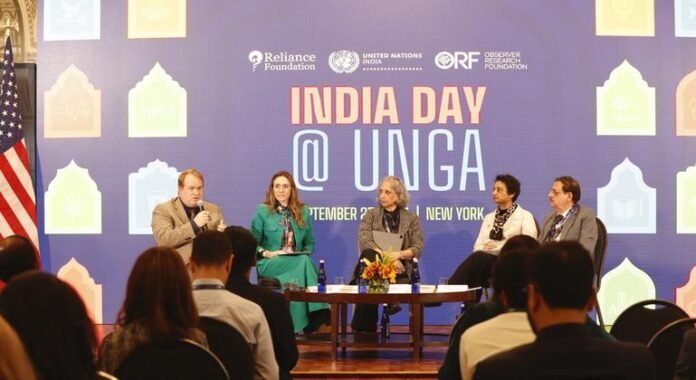The dialogue on insights for sustainable development beyond 2030 was titled, ‘Tiger’s Tale: Crafting a New Development Paradigm.’
At the event, India’s growing role as a leader in the Global South and its potential to set new standards in global development were discussed.
On this occasion, India’s External Affairs Minister Dr. S. Jaishankar said how leadership in the Global South has now become a reality.
He said India’s role in the UN is recognized as a nation with a big heart – a nation that has brought the Global South back into dialogue.
India’s External Affairs Minister said it is important to look at how we can democratize technology, the global workplace, and adopt a systematic and acceptable approach to it.
India’s Permanent Representative to the UN, Ambassador P Harish said that India, with the largest youth population, has to play a bigger role at the global level. 18-year-olds are an important part of the political process and young people will emerge as a major issue.
“When the tiger story is told, the cubs and young tigers will tell it,” he said.
Isha Ambani, Director, Reliance Foundation of India, on the occasion, focused on the ‘Five Pathfinders of Sustainable Development’, which she named ‘Panchantar’.
He emphasized the transformative power of technology under the ‘Panchatantra’ to harness the power of women, unlock the potential of the youth, encourage partnerships for innovation and create a bold vision of the future.
He said, “As world leaders gather in New York this week to discuss development, it is clear that our world is changing rapidly. In particular, India has stepped into its rightful place, where it is playing an important role in shaping the new global order.”
“But this moment is about more than just change – it’s about building a better future together, especially for our young people. We have many challenges ahead of us but we can make real progress.”
Sultan Ahmed Bin Sulayem, Chairman and Chief Executive Officer of DP World Group, who attended the event, emphasized the sustainability and concept underlying international trade and said that the current connectivity system is weak.
He said, it is necessary to create a strong communication system for the benefit of all.
Guyana’s Minister of Foreign Affairs, Hugh Hilton Todd, said that we have only achieved 17% of the SDGs. It means something is wrong. Although the problems are identified, we need political will to achieve the goal of leaving no one behind and for this we depend on the leadership of countries like India.

Panel discussions and publications
A number of panel discussions were organized as part of India Day, which included an emerging southern pathway, the potential of technology, the power of women-led development and India’s Life Economy.
In these sessions, proposed solutions and opportunities for the future world were discussed in detail.
During the programme, a special publication jointly developed by Reliance Foundation, ORF and United Nations India Office, “The Next Frontier: Charting the Post-2030 Development Agenda”. Also published a booklet named.
The booklet is a collection of 27 essays by global experts that explore the strategies, innovations and leadership needed for a new global development agenda beyond 2030.
India Day @UNGA aims to play a stronger role in world development discussions with India’s growing leadership.

